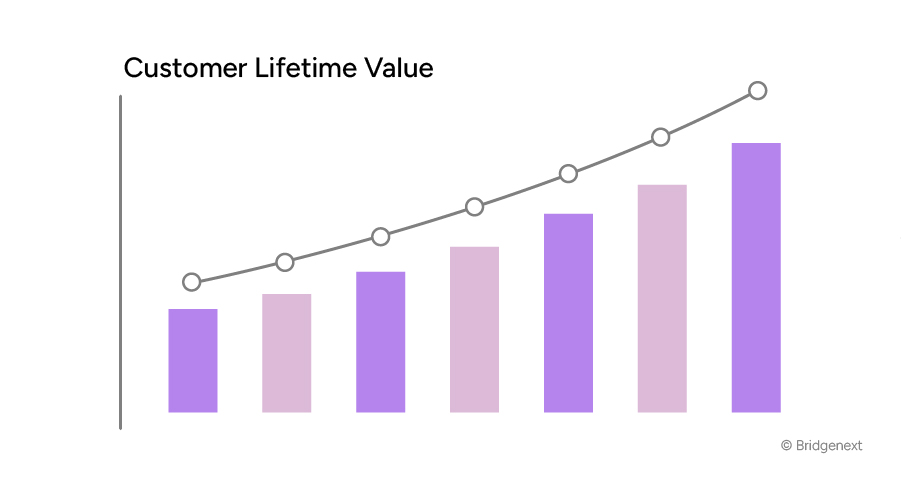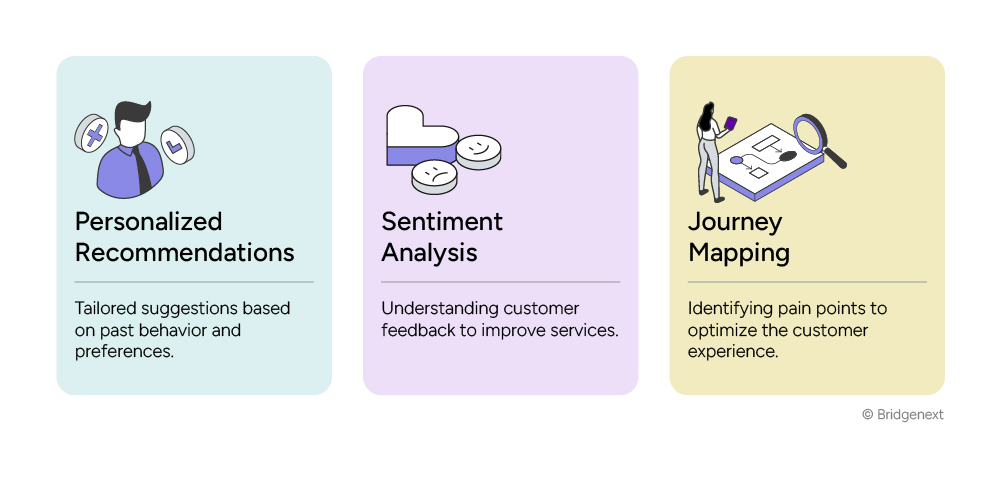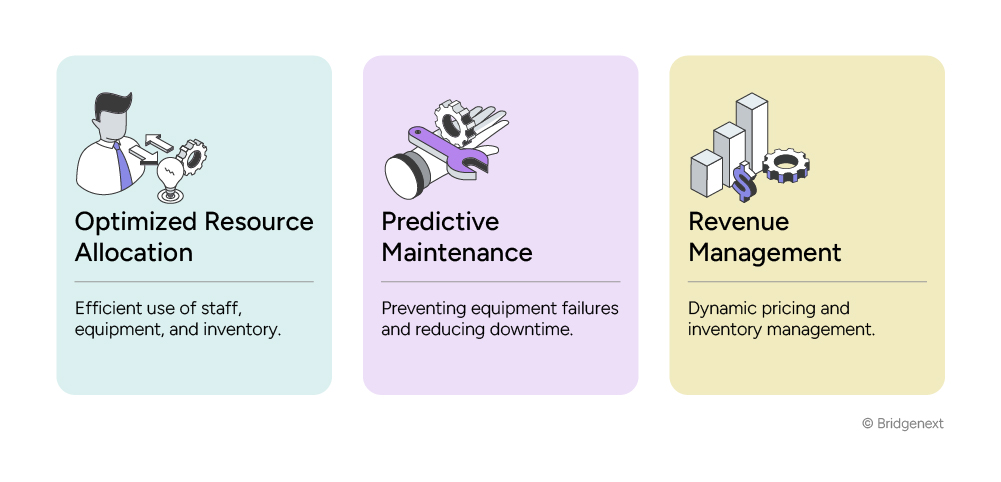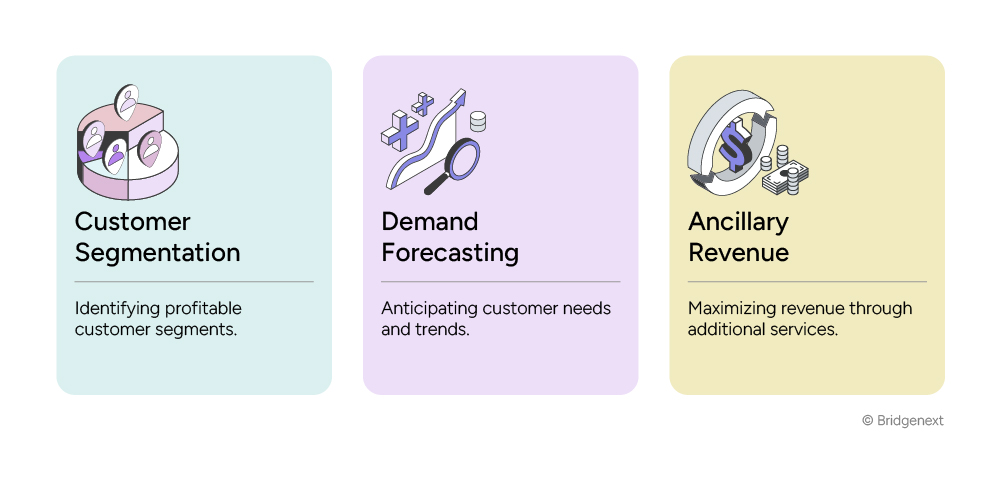09.12.24 By Bridgenext Think Tank

The travel and hospitality industry is undergoing a significant transformation, shifting its focus from simply booking accommodations to creating memorable experiences that keep guests coming back. Success requires a customer-obsessed approach, where every moment is an opportunity to make a lasting impact. Many of the world’s most successful brands have risen to the top by understanding the importance of increasing customer lifetime value (CLV).
89% of the companies now see customer experience as a vital part of the drive for loyalty.
– Markinblog
Customer Lifetime Value (CLV) is a metric that estimates the total revenue a business can expect from a single customer throughout their relationship. It’s not just about one transaction—CLV considers the entire customer journey, from the first interaction to the last. In the travel and hospitality industry, where customer loyalty is crucial, maximizing CLV means more than just retaining customers; it’s about deepening relationships to ensure repeat business and increased profitability over time.
Companies that effectively use customer data to enhance personalization and customer experience see a 5-15% increase in CLV, as personalized offers lead to higher conversion rates and customer loyalty.
– HospitalityNet
Why is CLV so important? Because acquiring new customers is often far more expensive than retaining existing ones. By focusing on CLV, businesses can enhance customer satisfaction, drive repeat bookings, and ultimately boost revenue. In a highly competitive market, those who master the art of increasing CLV will find themselves ahead of the curve with a loyal customer base that sustains long-term growth.
According to a global survey, 86% of industry executives believe data can help their companies become more profitable.
– Hospitality Technology
Businesses need to harness the power of data-driven strategies to increase CLV effectively. This involves gathering and analyzing customer data to understand their preferences, behaviors, and needs. Every interaction a guest has with a travel or hospitality brand leaves behind a digital footprint. From booking preferences and stay patterns to social media engagement and customer support interactions, data is being generated at an unprecedented rate.
With these insights, companies can tailor personalized experiences that resonate with individual customers, fostering loyalty and encouraging repeat visits. Advanced analytics, AI, and machine learning models can predict customer behavior, enabling businesses to anticipate needs and offer timely, relevant services.
Businesses can unlock a wealth of opportunities by effectively capturing, analyzing, and leveraging customer data to improve customer lifetime value. But the process comes with lots of business challenges, like:
Acquiring a new customer can cost 5 to 7 times more than retaining an existing customer.
– Havard Business Review
Increasing a retention rate by just 5% can boost overall profits by at least 25%, and potentially by as much as 95%.
– Bain and Company
Why is this the case? For starters, existing customers already have an awareness of – and at least to some extent, appreciation of – a brand and its products. The longer that they shop with a particular brand, the more positive they will feel about it, making them far more likely to turn to that brand before considering any competitors. Because of these factors, improving customer retention can make an enormous difference to Customer Lifetime Value (CLV) and, by extension, boost any retailer’s bottom line.

Overcoming these challenges requires a strategic approach that combines robust data management, advanced analytics, and a deep understanding of customer preferences.
Data is reshaping how people want their travel and hospitality experience. By harnessing the power of big data and advanced analytics, travel companies can:
By analyzing vast datasets, hotels, airlines, and other hospitality businesses can uncover hidden patterns in customer behavior. This allows for hyper-personalized recommendations, from tailored room upgrades to curated local experiences. Additionally, sentiment analysis of guest reviews and social media can pinpoint areas for improvement, leading to enhanced customer service, like:

Monitoring online reviews, social media, and guest feedback allows businesses to identify areas of improvement. Sentiment analysis can help pinpoint specific issues and track customer satisfaction over time. By addressing negative sentiment promptly, hotels can enhance their reputation and customer lifetime value. Also, streamlined operations enables:

Data has immense potential for revenue growth. Predictive analytics can identify high-value customers, predict their behavior, and tailor marketing campaigns accordingly. Businesses can optimize pricing strategies and drive upsell opportunities by understanding customer preferences and booking patterns. With the right data and analytical tools, the travel and hospitality industry can unlock a world of possibilities:

Personalization is a hallmark of the modern digital experience. Whether you’re scrolling through Netflix queues or booking a hotel for your next trip, the content and recommendations you see have been tailored to your interests—and with good reason.
Companies that excel in personalization can generate 40% more revenue than competitors that don’t.
– McKinsey
Not only is personalization important, but it is also important to consider how and where it is delivered, as highlighted by insights from consumer surveys. Here’s how personalization helps:
Loyalty and rewards programs are essential in helping keep customers loyal to a brand. These programs encourage customers to make repeat purchases in exchange for a reward, often by giving them points or another type of brand-exclusive currency that customers can spend on products or services. These programs can also involve:
Pricing is a critical component of the travel and hospitality industry. It directly impacts revenue, occupancy rates, and customer satisfaction. A well-crafted pricing strategy is essential for maximizing profitability while maintaining a competitive edge. Look at some strategies in travel and hospitality:
Tuning your customer lifetime value data engine to generate the advantages of personalization, dynamic pricing, and targeted promotions requires both technical capability and know-how. In other words, you need the right technology and the right partner.
That is why it is crucial to identify the ideal technology provider for your business. A partner who knows and understands your industry, the travel and hospitality space, and how to use data to their advantage is the key to unlocking your customer’s lifetime value and increasing the program’s potential.
At Bridgenext, we believe in creating more than just exceptional customer experiences; we aim to build lasting relationships that anticipate and meet customer needs.
Our goal is to maximize Customer Lifetime Value (CLTV) in your travel and hospitality business by leveraging our data-driven strategies and cutting-edge technology. By adopting personalization, dynamic pricing, and targeted promotions, we help you gain measurable results. This combination of industry knowledge and innovative data expertise allows Bridgenext to deliver customized solutions with tangible outcomes.
We’re the partner who is going to innovate with you and deliver on your organization’s natural roadmap for enhancing CLV.
References
hospitalityinsights.ehl.edu/data-driven-marketing-strategy-hospitality r-loyalty-retention-statistics/
hbr.org/2014/10/the-value-of-keeping-the-right-customers
www.markinblog.com/customer-loyalty-retention-statistics/
www.mckinsey.com/capabilities/growth-marketing-and-sales/our-insights/the-value-of-getting-personalization-right-or-wrong-is-multiplying
www.capillarytech.com/blog/loyalty-programs-the-profitable-engine-of-the-travel-hospitality-industry/
www.r-growth.com/post/pricing-strategies-for-luxury-hotels
www.hospitalitynet.org/opinion/4123326.html